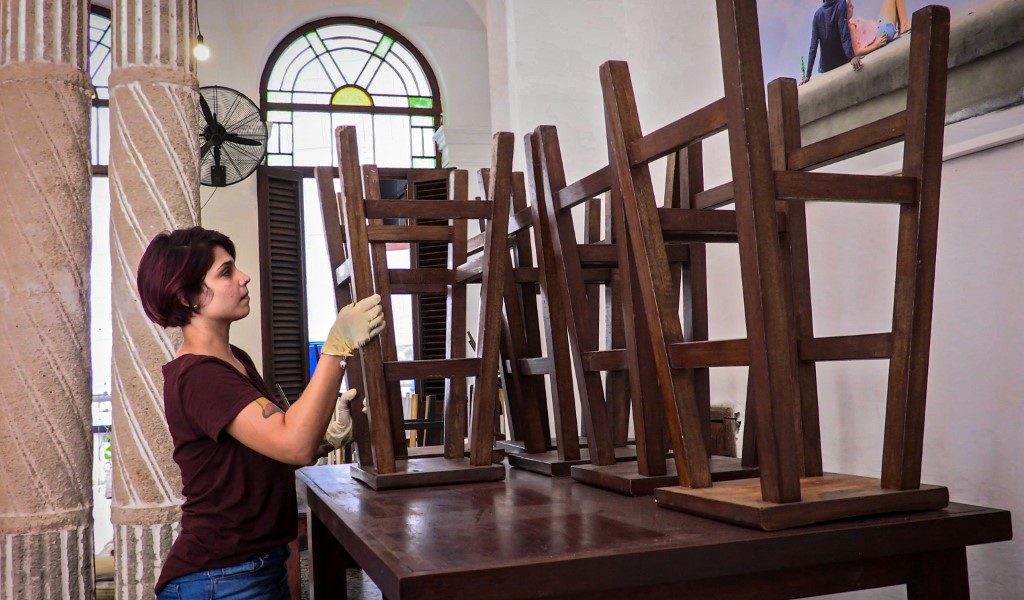SUMMARY
This is AI generated summarization, which may have errors. For context, always refer to the full article.

HAVANA, Cuba – Havana is a ghost town. The American convertibles swooned over by tourists are back in the garage, while most restaurants and cafes are closed.
Cuba’s private sector has been suffering since the island nation closed its borders over the coronavirus pandemic.
In the charming old building where the 1993 comedy Strawberry and Chocolate was filmed, a spiral staircase leads to the deserted La Guarida, the most famous privately-owned restaurant, or “paladar,” in Cuba.
“We decided to close the restaurant from March 15,” 9 days before Cuba’s authorities imposed their first virus-linked restrictions, said owner Enrique Nunez.
By Saturday, April 18, the country of 11.2 million people had close to 1,000 coronavirus cases and 32 deaths.
“I have friends with restaurants in Spain, they told me what was happening, about the danger, the difficulty of continuing to serve customers in these conditions,” Nunez told Agence France-Presse.
His restaurant usually serves 200 people for each sitting.
Omnipresent in tourist guides, it’s a must stop for many visitors, including stars such as Beyonce, Madonna, or Pedro Almodovar, whose photos adorn the walls.
“That was the main reason we took this decision. We’re a very attractive site, many people arrive in Havana with the desire to experience La Guarida.”
What that meant was that “we were on the front line” of potential coronavirus infections.
‘Tourism was already struggling’
In this communist country where the state and its businesses dominate economic activity, the private sector has little by little managed to make its mark over recent years: it now employs almost 635,000 people, or 14% of Cuba’s workforce.
These Cubans rent out rooms, run small restaurants or hair salons, among other activities.
“Many private enterprises were built on tourists, because no Cuban is going to go to a restaurant and spend $100 on a meal,” said economist Omar Everleny Perez.
So they quickly sensed the danger: two days after the borders were closed to non-residents – a measure subsequently expanded to all arrivals – 16,000 private workers asked for their licenses to be suspended, according to the Labor Ministry, which temporarily exempted them from taxes.
By Wednesday, April 15, that figure had risen to 119,000, around 19% of the private workforce.
This health crisis could not have come at a worse time, on the back of two bad years when Cuban businesses suffered under the increased sanctions imposed by the administration of US President Donald Trump.
“The private sector was already struggling, especially in Havana, after the American cruise ships stopped coming” from June 2019 due to new sanctions, said Perez.
It meant that in 2019, the number of tourists dropped by 9.3% to 4.3 million.
Over recent years, Americans had become the second largest group of tourists after Canadians, thanks to the thawing of tensions with the United States since 2014, under the Barack Obama administration.
‘Sorry, we’re closed’
In January and February, tourist numbers were down 16.5% on the previous year, with a drop of 65% for Americans.
The sector, the second largest revenue generator on the island nation, was worth $3.3 billion in 2018.
Even before the coronavirus outbreak, restaurants and sales weren’t posting “the same numbers as two years ago, and now COVID-19 has arrived and finished them off,” said Perez.
It’s been tough on employees used to much higher salaries than the average $50 a month in the public sector.
“Sorry, we’re closed,” says the old metal sign attached to El Cafe, a coffee shop in Havana’s now deserted old town, popular among tourists.
Loliet Gonzalez, a 25-year-old psychology student who’s worked there for two years, said her earnings “allow me to have the quality of life I want.”
Her boss gave her two weeks’ salary to keep her going through the crisis.
“For now I’m fine but there will come a time when I’ll have to delve into my savings,” said Gonzalez.
The owner, Nelson Rodriguez, is already planning for a future in which Cuba’s private enterprises cannot rely on tourists in the same way as before.
“If there aren’t any tourists, we’ll have to focus on Cuban people, so maybe we’ll have to adapt our business” to the disposable income of locals, said Rodriguez, his face covered by a mask. – Rappler.com
Add a comment
How does this make you feel?
There are no comments yet. Add your comment to start the conversation.